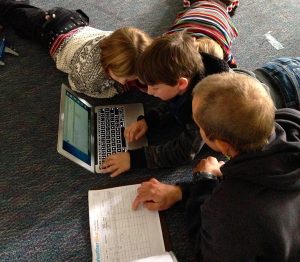The Next Generation WeatherBlur Project is an evolving online learning community for students (grades K-8), teachers, scientists, fishermen, and interested community members to explore the local impacts of weather and climate in coastal communities. The WB learning community uses online technologies to participate in an evolving set of co-created citizen science projects, deeply authentic real-world investigations developed in ongoing and negotiated partnerships between scientists and members of the public. These co-created projects are rooted in place-based weather and climate questions that matter to citizens and provide highly valued data to scientists.

Sound like fun? GREAT! MMSA is looking to recruit up to 13 communities from throughout Maine to participate in this project. We are recruiting coastal schools near Portland, mid-coast and downeast Maine in particular. Teachers receive a stipend for participation, funds for substitutes during professional development workshops, and access to an exciting interdisciplinary community of citizen scientists. We anticipate launching the project in classrooms in Fall 2017, but would like to work with teachers and interested communities throughout Spring 2017 to begin structuring what it will look like in the Fall. If you or someone you know are interested please contact Ruth Kermish-Allen.
The Next Generatior WeatherBlur project is funded by a competitive $1.35 million grant from the National Science Foundations Cyberlearning and Future Learning Technologies program awarded to MMSA this fall.
This project is led by MMSA and will build on partnerships amongst Maine-based organizations including NBT solutions as the designers of the online platform, Island Institute, and Penobscot East Resource Center to ensure applicability of the project to Maines fishing communities, and a large host of strong national organizations. Many members of this team have been involved in the WeatherBlur project from the beginning when the WeatherBlur EAGER was launched in 2013 for a small cohort of Maines island communities in southern and central Maine. That initial launch resulted in an exciting bycatch investigation with elementary school students, scientists, and fishermen, which uncovered an invasion of green crabs around island communities and provided highly valued, previously unavailable data to the scientific community to track that invasion.


